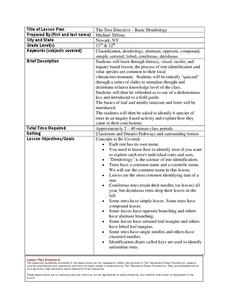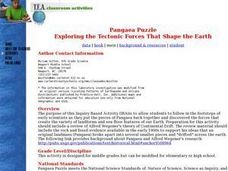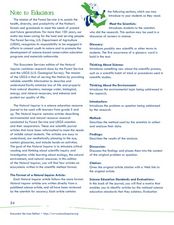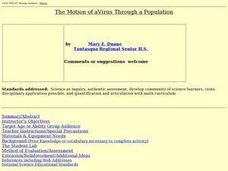Curated OER
What's Under There?
Young scholars determine ways to make "observations" about unknowns, such as the land beneath an ice sheet or the interior of the Earth, using tools other than sight. They build "mystery boxes" and exchange them with other groups to...
Curated OER
Paper Towers
Young scholars have the opportunity to use model-building as a way to help comprehend the forces and phenomena at work in the world around them. They describe gravity as a universal force that pulls everything toward the center of the...
Curated OER
Insect Monitoring
Students practice the scientific method in the classroom, either in preparation or as a substitution for real-world field experience. They examine a simulated biodiversity research situation, using a "mini-plot" or
sampling square...
Curated OER
Penguins Nesting Know-How
Young scholars maintain a field journal as they follow penguin parents raising their chicks during the breeding season. They formulate testable questions. Students reflect on animal behavior in the field related to survival and chick...
Curated OER
The Tree Detective - Basic Dendrology
Students identify tree species by their leaf characteristics. In this dendrology lesson, students learn leaf vocabulary and collect leaves. They identify the leaves using the leaf characteristics and the vocabulary that they learned.
Curated OER
Exploring Functions with Calculus and Dynamic Software
Calculus can be project-based and inquiry-centered by using dynamic software.
Curated OER
Pangaea Puzzle: Exploring the Tectonic Forces That Shape the Earth
Sixth graders follow in the footsteps of early scientists as they put the pieces of Pangaea back together and discovered the forces that create the variety of landforms and sea-floor features of our Earth.
Curated OER
Whale Watcher Game Lesson
Students participate in an online whale watching game. They identify the reasons for migration and describe the route. They make predictions on what would happen if the ways did not migrate.
Curated OER
Predator Protector Game
Students take on the role of an Ocean Adventures expedition volunteer member and are charged with protecting three species of sharks from danger in order to defend the balance of nature in the ecosystem. They play an online game which...
Curated OER
Magnets
Students explore how the earth is a magnet and that magnets have two "poles". In this magnetic instructional activity students complete an activity by designing their own compass.
Curated OER
Stomata: Microscopic Openings that Let Plants Breathe
Students participate in a lab experiment to observe and measure the opening and closing of stomata. They focus on photoperiod, locate and identify stomata on a leaf and explain the role of stomata in the daily functioning of a plant.
Curated OER
Inference By Analogy
Students infer the use or meaning of items recovered from a North Carolina Native American site based on 17th-century European settlers' accounts and illustration.
Curated OER
Contextual Clues
Learners observe and interpret images of artifacts in different contexts in order to recognize importance of leaving artifacts in original context to correctly understand their meaning, and observe what is surrounding object to interpret...
Curated OER
Introduction to Ocean Grazers
Students explore biology by creating a poster with classmates. In this oceanography instructional activity, students identify the importance of coral reefs to the ocean's ecology and examine a food web of ocean animals. Students define a...
Curated OER
Natural Inquirer Ecosystem Article Lesson
Students discover new ways to preserve the ecosystem by completing graphic organizers. For this environmental lesson, students read an article from the Natural Inquirer in small groups and fill out a graphic organizer based on the...
PBS
Predicting/Making a Hypothesis
Students analyze information from a variety of sources in order to create a hypothesis about the origin of an interesting family artifact.They create alternative hypotheses based upon available information to demonstrate that some...
Curated OER
Reel Projects
Students investigate projectile motion. In this projectile motion lesson, students investigate a website with an interactive lesson. Students view the changes in the projectile they see in the lesson. Students watch short video clips and...
Curated OER
Filling in the Picture
Students study archaeological sites. They discover some of the problems inherent in choosing sites and what parts are chosen for excavation. They evaluate and explain their choices for study and articulate the process of archaeological...
Curated OER
Biological Relationships - Coral Reef Memory Game and Chain Game
Middle schoolers familiarize themselves with the interconnectedness of species within an ecosystem, and to use this knowledge to evaluate how the removal or decimation of one species can have far reaching effects.
Curated OER
The Aquatic Environment
Fifth graders focus on the various types of fish living in different water environments. In groups, they research the different methods used to fish and participate in experiments to determine the effects of mercury on fish, the...
Curated OER
Pieces of the Past
Students study the importance of preserving the archaeological record. They write a paragraph describing an object and why it is important to them. They cut their paper into a puzzle and compare their own to the student they trade with.
Curated OER
The Motion of a Virus Through a Population
Students test the factors that influence the rate at which a virus spreads through a population. They complete a lab activity then discuss data collected and review and answer a set of questions.
Curated OER
Hot Cans and Cold Cans
Students investigate the physics of heating and cooling through conduction, convection, and radiation. Working in groups, they determine the best way to cool a can of water and warm a can of water. Temperature is taken at five minute...
Curated OER
Cardiovascular Disease and Fitness: Exploring the Rhythm of Your Pulse
Students explore several examples of cardiovascular diseases. In this anatomy instructional activity, students explain why physical fitness is very important. They count their pulse rate and record them on a data table.
Other popular searches
- Inquiry Based Science Lessons
- Inquiry Based Science Water
- Science Inquiry Based
- Inquiry Based Science Lessons
- Inquiry Based Science Sose
- Inquiry Based Science Souse
- Science Inquiry Based Learning























